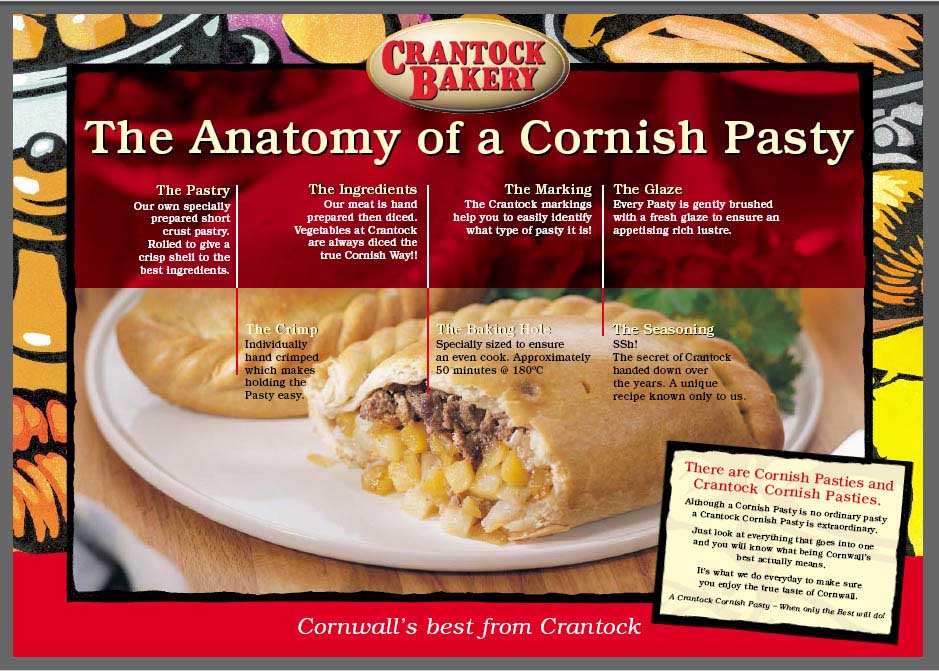.
Richard: Last month the Cornish pasty won protected status from the European Commission. So for this week's podcastsinenglish.com business podcast we're talking about Protected Geographical Status.
Jackie: ...and Cornish pasties of course! Now, Richard just… just explain, what is a Cornish pasty?
Richard: [laughs] Well, it's a pastry um… filled with meat and vet… vegetables which was traditionally made for miners but it became popular throughout the UK and er… very tasty they are too.
Jackie: Mmm. So, this Protected Geographical Status is a legal framework isn't it, defined in European Union law and it's to protect the names of regional foods. The idea is also… it’s… it's to eliminate unfair competition.
Richard: Exactly, so it’s um… protects the consumers from er… non-genuine products.
Jackie: Right. Now there are three regimes they call this within… within the framework and the strictest one is the PDO.
Richard: Protected Designation of Origin. Which basically means the entire product is traditional and it's entirely manufactured within a specific region and therefore has these unique properties.
Jackie: Yes. And… and the most famous one, as an example for this, is Champagne.
Richard: Yes. You can't make champagne unless it comes from Champagne.
Jackie: Which is a er… a region of France.
Richard: Exactly. And also um… Feta is a big one.
Jackie: Feta cheese.
Richard: Feta cheese can only be made in Greece.
Jackie: Mmm, yes.
Richard: So I presume that’s the same as the Cornish pasty, is it?
Jackie: Ah. Now the Cornish pasty has the second step down as it were, the second regime um… which is the PGI, the Protected Geographical Indication. The main difference here is that um… the product doesn't have to made entirely in this particular area, it can be made um… just partially and in the case of the Cornish pasties, although they’re made in Cornwall, they are actually cooked elsewhere.
Richard: As far as I’m aware they are made or were made all throughout the UK. But now they're saying for a traditional, proper, Cornish pasty can now only be made in Cornwall.
Jackie: Yes. Something similar can be made elsewhere but they cannot give it the name Cornish pasty. It's protecting the name.
Richard: Exactly.
Jackie: And then the third step is the TSG, the Traditional Speciality Guaranteed and this just basically means that the product should be made…
Richard: …in a traditional method.
Jackie: In the traditional method specific to that product.
Richard: And so it's not dependent on where it's from necessarily.
Jackie: No, no. So an example of that is Jamón Serrano which is a ham fromSpain but actually anybody can make the ham and call it that, as long as they make it to… in the traditional way.
Richard: Right, ok because it's not from a specific area of Spain then.
Jackie: No
Richard: It's just the way it's cured, this ham. Yes, I must admit I think these are very good in protecting various products, traditions etc but I must admit the EU, I think some of them, I'm sorry, Cornish pasties, it's the world gone mad. I grew up on Cornish pasties where I came from in the north of England and if I can't eat them anymore I'll be very disappointed.
Jackie: You say that Richard but, you know, the campaigners who were… who were really hoping that the Cornish pasty could have this special label attached to it were really pleased because it's… it’s supporting the local economy, their factories are now going to be protected,it’s going to support jobs and don't forget its also protecting the way things are made. So I think it’s a positive thing.
Richard: Yes, but my local bakery, Queen's bakery, they made fantastic Cornish pasties.
Jackie: And now they just make fantastic pasties. Richard: Yes, I suppose so!
